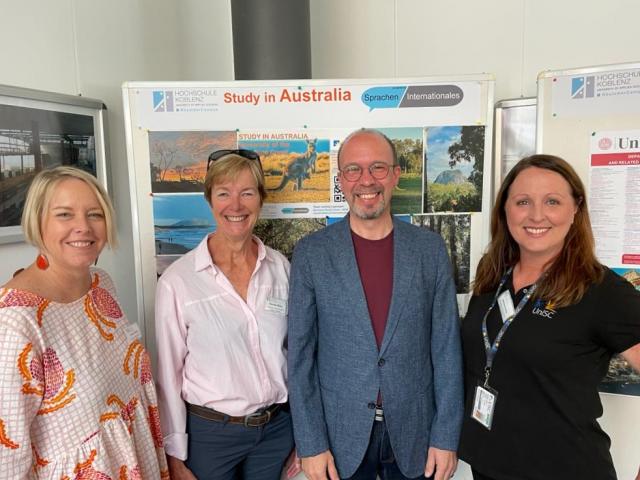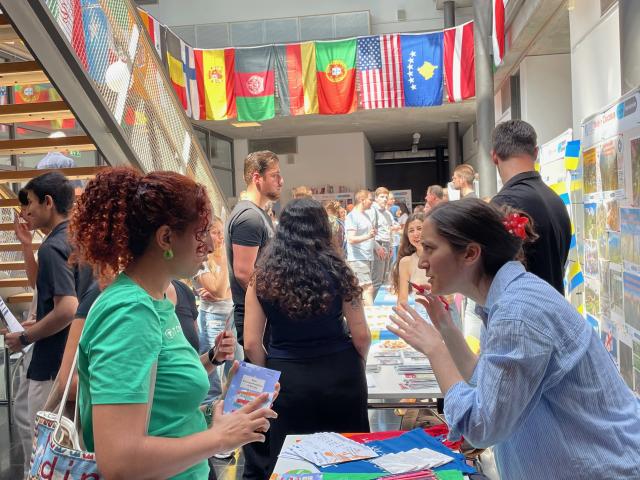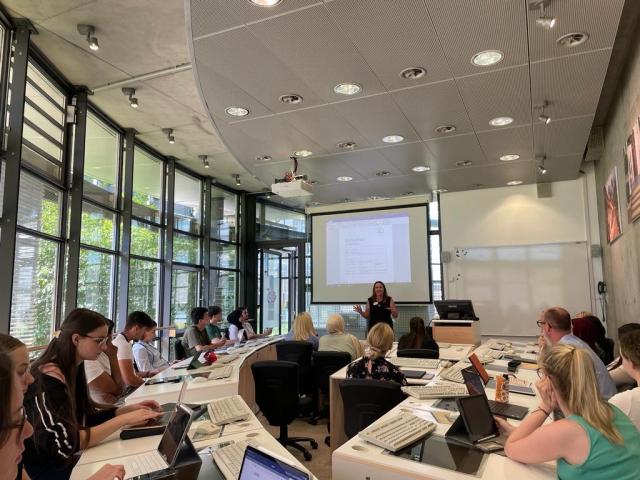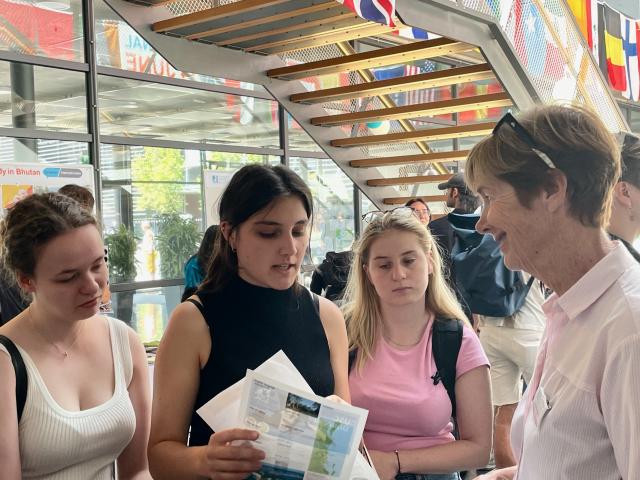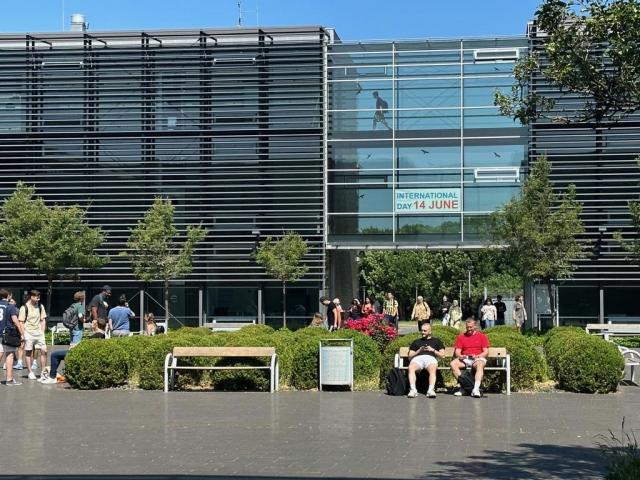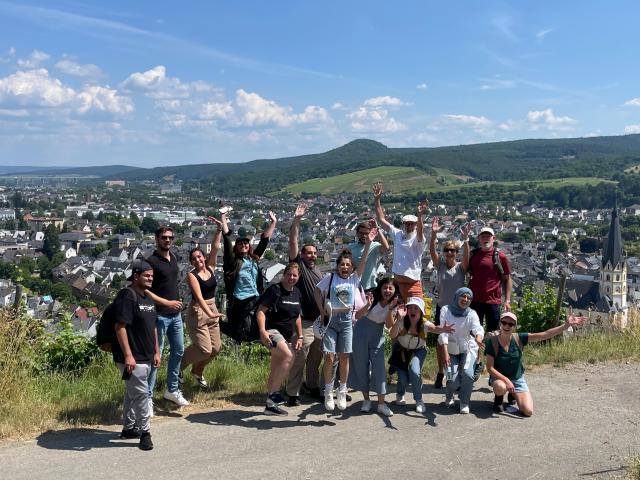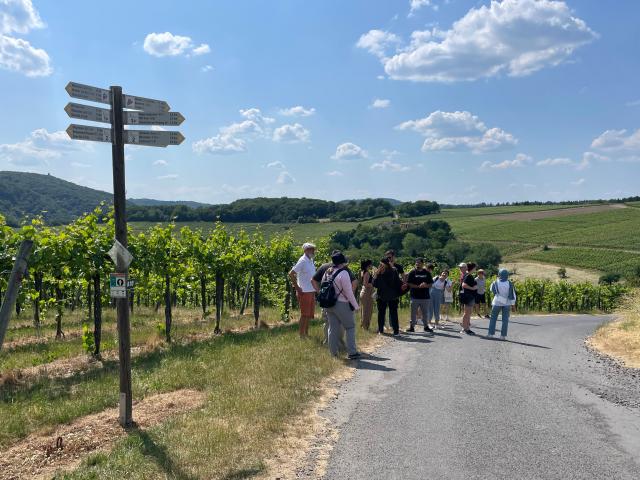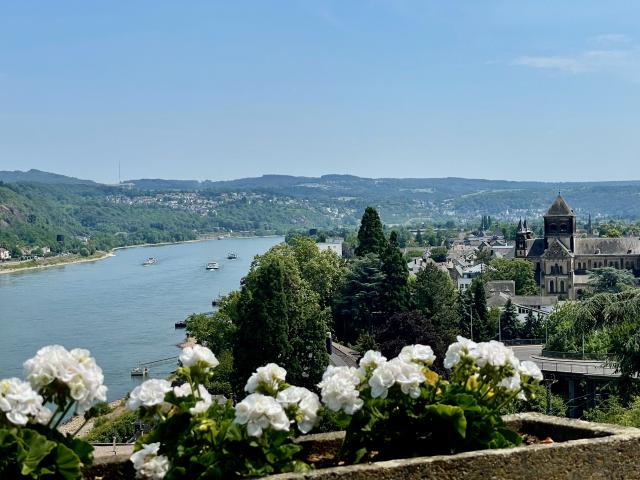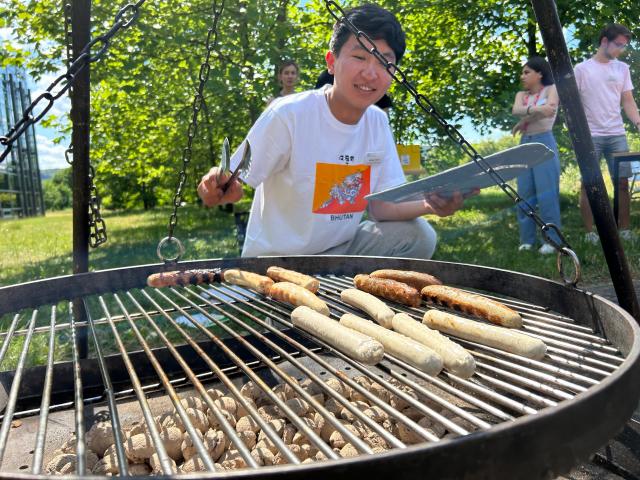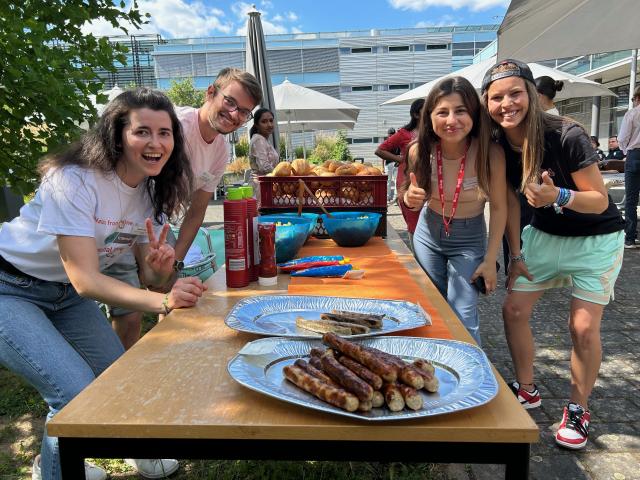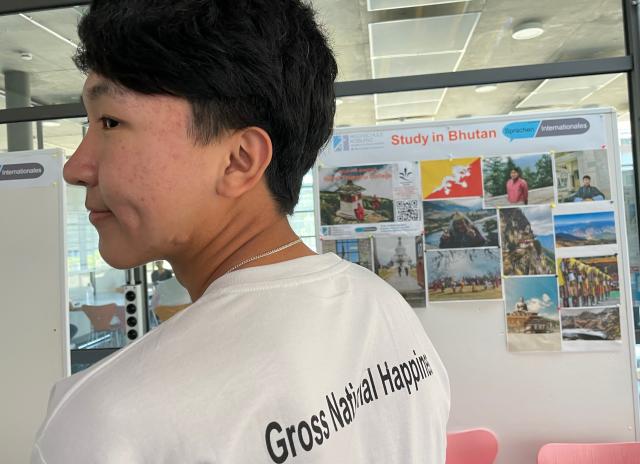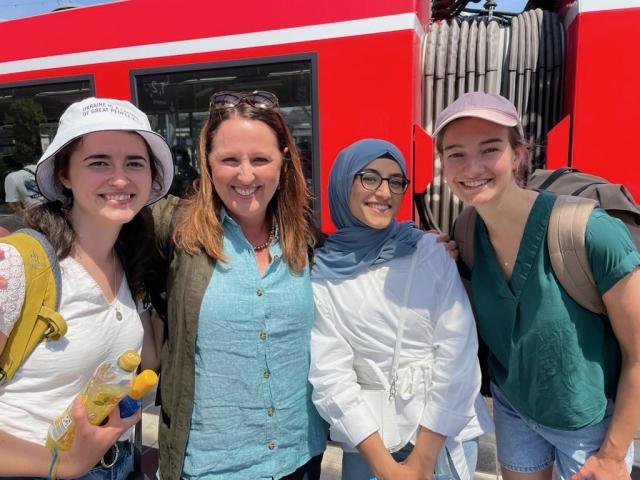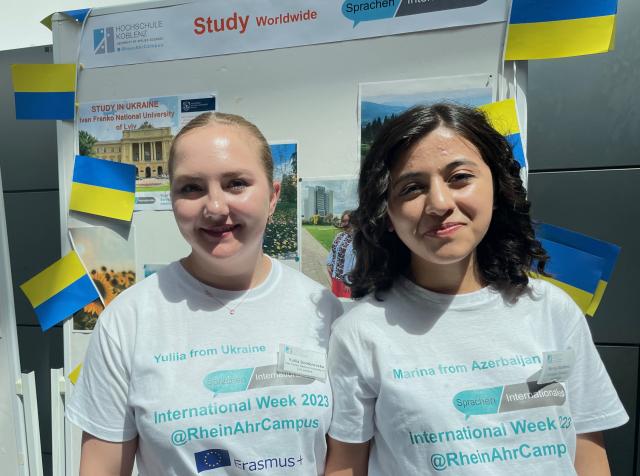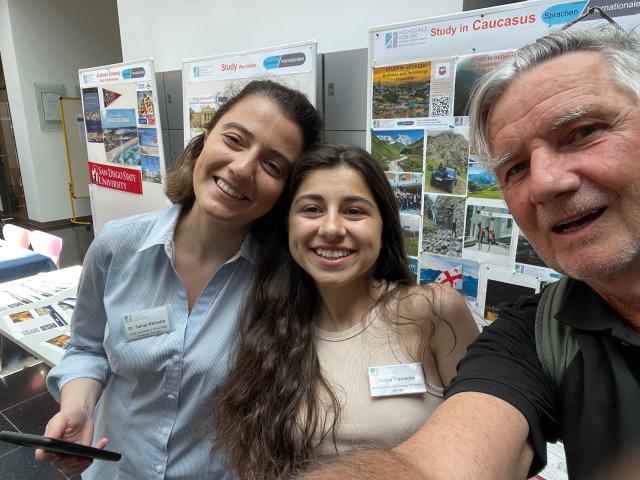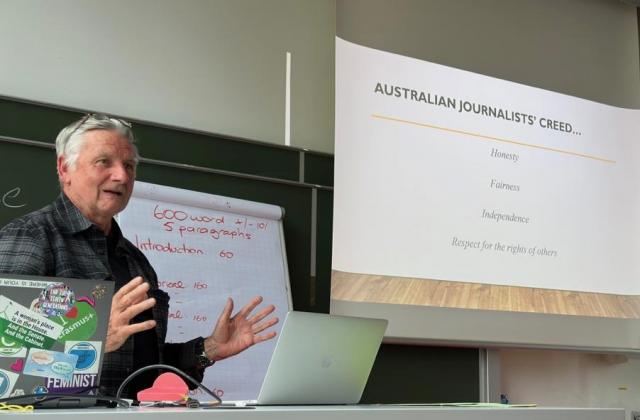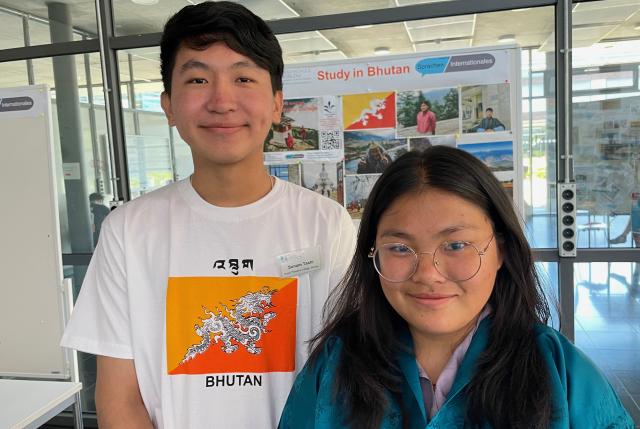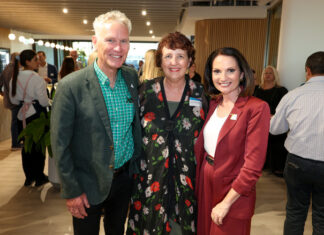PRECEDE
When three University of Sunshine Coast lecturers undertook an exchange program in Germany they learnt as much as they taught. ERLE LEVEY was intrigued by the differences in perception and reality.
BREAKOUT QUOTE
“Being trusted with people’s personal experiences and emotions – it’s been fabulous. I loved the opportunity to work with students in this multi-cultural experience.”
Reality can be so different to perceptions and expectations.
When three lecturers from the University of the Sunshine Coast visited Germany this year on an exchange program, it wasn’t simply a case of teaching but a chance to learn. Not just about the education system but the students, the staff and the country.
The beauty of exchange programs was there for all to see … perceptions and stereotypes were smashed.
German precision – especially in engineering – is still evident.
However, instead of manicured lawns in the streets of the towns and the university campus at Remagen, there were wildflowers and long grass to attract biodiversity as well as a rambling effect.
A lot of the engineering and industrial manufacturing, for which Germany is world-recognised, is now done offshore.
Yet, Germany has done the heavy lifting when it comes to refugees from war-torn areas such as the Middle East and parts of Africa and Asia.
It has emerged as a significant partner for Australia in terms of world affairs, trade, cultural and defence alliances.
While we were there, Australia had delegations in regard to climate change and the environment, with Europe as a trading partner, and in terms of global alliances.
Germany is now one of the dominant economies in Europe, but also plays a significant role in ensuring all European Union countries are treated fairly.
There are significant similarities between Australia and Germany in terms of the importance of tourism to the economies.
It is one of the G7 nations – a group dedicated to solving global issues in areas of trade, security, economics and climate change – yet the whole of Germany fits into half the size of New South Wales.
There was a world conference on climate change in Bonn one weekend and we met with First Nation American Indian Michael Lane and the delegation from the West African nation of Gambia, headed by African Youth Commission member Aisha Secka.
This introduction to Germany served us well for the university exchange program.
While the people in the Rhine and Ahr Valley region generally appreciated their privacy, they were also very warm and embracing.
RheinAhr Campus in Remagen was the host university for the lecturers who are recipients of the Erasmus Teaching Scholarship Program.
The lecturers – Mandie Miller, Sandie Elsom and Melissa Innes – were looking to increase the learning capability of students, swap teaching ideas and encourage greater cultural links between the two partner universities.
The classes at the university campus, which we attended, were often made up of 30 percent of students with German-born parents and others from many of the 40 partner universities RheinAhr was involved with.
The children of refugees made up a significant part of the student body – coming from the Caucasus region of Asia, such as Georgia, Afghanistan and Azerbaijan, Albania in the Middle East, along with Iran, Syria, Turkey, and African countries such as Morocco.
There were also students and lecturers from Nepal, from Italy and the Pacific areas, including Japan, and Korea … from the US and Canada.
It was a true melting pot.
For Mandie Miller, an adjunct lecturer in outdoor environmental education, it was a matter of being part of the community rather than just a tourist.
“Being trusted with people’s personal experiences and emotions – it’s been fabulous,’’ Mandie said.
“I loved the opportunity to work with students in this multi-cultural experience.
“The classes were based on discussions to improve their English, and provided the opportunity to deconstruct cultural biases. It was a chance to hear and learn from those whose cultures are less commonly represented and understood.
“Discussions and assessments encouraged conversations about the student’s cultural practices and history, and developing an understanding of the perspectives and practices of their classmates from other ethnicities and religions.
“One of the most exciting and rewarding parts of the experience was observing students as they developed confidence in their spoken English and the ability to speak publicly in the safe environment of the tutorial room.
“This is a challenge, especially for girls of some ethnicities and religions.
Mandie’s favourite moment was when one particular girl on a semester exchange, when interrupted by a fellow student, said, “Please do not interrupt. I am speaking now.’’
This was not the traditional way for a young woman from her culture to speak and instead, because of the exchange experience, she emerged as a confident member of an intercultural environment.
Another class required students to research a cultural behaviour or tradition from their own perspective and then interview a person to obtain another cultural perspective.
Mandie was interviewed on Australian marriage practices.
“The interview enabled me to reflect on marriage from both legal and traditional viewpoints, as I explained the legalisation of same sex marriage and the protections and acceptance of divorce.
“My interviewer was challenged by these concepts and explained the differences in her own culture’s attitudes.
“These provided insights into another culture at a very human level.
“Conversations with Ukrainian students, some with families living in the war zones, resulted in a connection and understanding far beyond what is possible by reading and watching the news.
“The presentations from the other staff at international week also provided insights into other cultures with which I am not familiar.
“The exchange experience is also a very social time with colleagues, and the comfortable and friendly environment provided the opportunity to talk in depth without the usual interruptions.’’
Apart from cycling along the Rhine River and the wine-growing areas for which the region is known, Mandie and husband Ian undertook canoeing on the many rivers and waterways for which Germany is renowned.
Melissa Innes, associate lecturer in management and human resources in the school of business and creative industries, saw the opportunity to improve communication awareness between students and lecturers.
Teaching in a regional university was an eye-opening, educational, and extraordinarily diverse experience, she said.
“One important difference I wasn’t aware of, is that education in Germany is free at public universities.
“In addition, there are a number of different types of universities – namely standard universities, universities of applied sciences, private universities and universities of cooperative education.
“Coming from a fee-paying, mostly public-funded, traditional tertiary education environment in Australia, to an applied science public university in Germany, required a new way of thinking.
“It challenged the methods I’d practised in teaching preparation and delivery for 20 years, and required flexible, creative, and considered practical solutions to curriculum delivery.
“Class composition in Remagen provided a rich and culturally diverse learning opportunity for students and teachers alike.
“Thirty percent of students in any one class were often domestic German students, while the other 70 percent comprised a range of generational migrants and children from refugee families – seeking to enhance their quality of life through educational programs such as those offered at RheinAhrCampus.
“The discipline focus of the faculty I was working in was International Business, with a particular emphasis on preparing students to operate in an international English-speaking business environment.
“Again, this required a change in teaching delivery style to ensure maximum opportunity for student learning in areas we may not consider necessary to teach in Australia such as how to compose meeting minutes and agendas, how to communicate ideas in culturally appropriate ways, or how to deliver an English-spoken presentation professionally and effectively to appeal to internal or external business clients.’’
On a personal level, Melissa gained rare insights into many culturally diverse views and experiences of students when they were challenged to present an issue in their life that they could explore from multiple cultural perspectives.
Students from the Kurdistan region of the Middle East, sharing the intricacies of the struggles between different ethnic, cultural and political groups; the young German student wrestling with the peer pressure from the high consumption of alcohol in his region; the young woman from the Caucasus who was confronted with a female relative facing the threat of a forced marriage and the fall-out if that was not followed.
“The views and stories were unique to each individual and their life experience, and created some amazing opportunities for reflection and analysis from multiple perspectives across difference countries and belief systems.
“This is something we would find very difficult to achieve in Australia, and it certainly provides our Australian exchange students with a memorable, educational, and life-changing opportunity to learn about issues they may not come across in their education at home.’’
A stand-out moment for Melissa was meeting a German student who had completed 12 months of study at UniSC about five years ago.
“I remembered her immediately, from my third year management class, when she re-introduced herself during our International Week presentations.
“I was moved by her recollection of stories from Australia, and how her exchange changed her life and the career opportunities she had since been presented.
“RheinAhrCampus should be congratulated on their enthusiastic and passionate commitment to the promotion of study abroad international student exchange programs.
“After seeing and hearing about the positive impact of these programs on students’ lives, I plan to encourage as many students as possible in Australia to take up this opportunity during their program of study.
“In addition, I have a deeper appreciation of the challenges that international students face when coming to Australia to study one or two semesters abroad.
“The language barrier, along with the many new cultural aspects of our society, presents hurdles I hadn’t necessarily considered when supporting students with their learning.
“We have exceptional programs of learning and teaching in our Australian universities.
“An unexpected outcome of this teaching exchange has been the fresh perspective and appreciation I have for the wonderful standards we uphold in our education system.
“I look forward to engaging more openly with international students about the rich cultural stories they can bring to our classrooms, as well as the local knowledge I now know is invaluable to share – to make their travel and learning journey a more supported and informed experience.’’
For Sandie Elsom, it was the fourth exchange visit since 2014 and the lecturer in technology education in the tertiary preparation pathway felt a lot more confident of understanding and coping with the differences between the universities and the two countries.
“Every time I come to Germany it becomes more apparent that I learn as much as the students do, if not more,’’ Sandie said,
“On this this trip I learned more about what it means to be progressive, independent and reliant on my upbringing in Australia.
“For example, a person from Georgia or Azerbaijan, who is socially progressive, will have vastly different ideas about what is acceptable than I will.
“It was really enjoyable to hear about the students’ experiences and to become aware of the different perspectives that people have about the same topics in different cultures.
“After hearing from the Indian students and the Georgian students, about how much pressure there is to get a degree and then a masters, and hearing from German students about how many exams they have, I’ve come to really appreciate the Australian style of blending theory and practice in our classes.
“Indian students tell me that their education is so theoretical that they can’t remember a lot of things immediately after they’ve learnt it.
“The Germans, from my observation, at least in this style of university – are learning all practical content – without including the theory that we are teaching in our Australian universities.
“So I feel that we have the blend right and the international students really enjoy it.’’
As well as time spent at the university, Sandie was able to take a boat cruise on the Rhine to Cologne and hop across the border into Belgium.
A PERSONAL VIEW
From a journalist’s point of view, it was interesting to see the changes in Germany over the years.
To see the beauty of cities such as Bonn and Koblenz, and the links they have with history dating back 2000 years.
The first time I visited Germany, Bonn was the capital of what was a divided country after World War Two.
West Germany and East Germany were split by the Iron Curtain – a political division between Western and Soviet philosophies.
The city of Berlin was divided by a virtually impassable wall.
I did not expect to see it fall in my lifetime – but it did. And I was touching remnants of it in a peaceful park in Koblenz.
The RheinAhr Campus is attached to University of Koblenz.
The city is at the junction of two major rivers – the Rhine and the Moselle.
This convergence has been significant through time and regarded as the Corner of Germany.
While in Bonn we enjoyed a coffee near a newspaper stand that former West German politicians would stop at on the way to parliament to catch up on recent events.
The newspaper stand and coffee counter are still there – testament to the need to meet and discuss personal issues yet in a different context these days.
Then there was the wine growing areas of the Rhine and Ahr Valleys.
While hiking on a wine trail we came across a secure bunker, built deep into a mountain at the time of the Cold War.
The West German Government developed it as a safe place to continue governing if relations with East Germany and the Soviet Bloc became even more strained.
It was very much a time of nuclear threat and thankfully it was not needed.
The Ahr Valley is one of the most important regions in Germany for wine growing.
Just like much of Australia, the region experienced serious flooding in recent years.
While the Mary River at Gympie rose to a one-in-100-year flood level, Ahrweiler in the Ahr Valley experienced a one-in-500-year flood and the loss of more than 120 lives.
It shows that communities at both ends of the Earth are similar in so many ways.
The teaching exchange is an exceptional experience for Australian lecturers to share and gain knowledge for the benefit of students across borders.
An unexpected outcome was how these exchanges provide rare insight into how cultural experiences can change perceptions we may otherwise hold for a lifetime.

